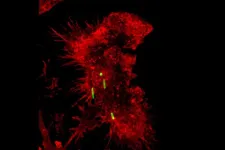(Press-News.org) URBANA, Ill. — A new analysis from the University of Illinois Urbana-Champaign and the USDA-Agricultural Research Service (ARS) has identified the top factors accounting for yield variability in processing sweet corn (used for canned and frozen products), including one within the control of processors.
“We used a very robust approach to account for sweet corn yield with field-level data across some 16,000 fields and 27 years. Year and production region were the two most important variables, which makes logical sense. But the third was seed source: the company that developed the hybrids. That's interesting because it’s actually something the industry has a choice over,” said senior study author Marty Williams, ARS ecologist and affiliate professor in the Department of Crop Sciences, part of the College of Agricultural, Consumer and Environmental Sciences (ACES) at U. of I.
The analysis drew from confidential industry data on 67 variables relating to crop genetics, management, weather, and soil factors from fields in the Upper Midwest and Pacific Northwest, where most of the nation’s processing sweet corn is grown. Williams and co-author Daljeet Dhaliwal, who completed his doctorate in the Department of Crop Sciences, used machine learning techniques to narrow down which of the dozens of factors correlated most strongly to yield across nearly 30 years.
Williams said the top two — year and production area — reflect big-picture environmental conditions affecting the crop over time and space. The third, seed company, came as a surprise because the researchers grouped hybrids into nine companies out of necessity. Without grouping the 100-odd hybrids in some way, the already unwieldy dataset would have been even more challenging to analyze and impossible to interpret.
However, the million-dollar question doesn’t have a satisfying answer, as the analysis doesn’t differentiate or rank the seed companies. Williams said there is a reason for that outside the confidentiality agreement.
“We don't know that every company’s hybrids were grown under conditions identical to their competitors,” Williams said. “One company may have higher yields, but it may also be that their hybrids were grown only in more favorable conditions. We know that processors prefer hybrids that perform well under all conditions, particularly less-than-ideal conditions. Still, it’s interesting that seed source linked highly to yield. We can't say exactly why, but seed source is the one thing processors can choose.”
Another striking variable, ranking just below seed company, was high nighttime temperature. Warmer-than-usual nights increase respiration, which offsets gains made during daytime photosynthesis. According to the analysis, sweet corn yield starts taking a hit above 16 degrees Celsius (61 Fahrenheit). Field corn yield, by contrast, doesn’t start declining until nighttime temperatures exceed 21 C.
“Sweet corn is a shallower rooted crop. It's a smaller plant, and it’s more delicate overall than field corn. So that makes some sense,” Williams said. “It could be concerning, because, at least in the Midwest, we are projected to have warmer nighttime temperatures. It's a correlation, but it's a concerning one.”
The same dataset already signaled sweet corn may be in trouble under a warming climate, but the current analysis gives Williams some hope, with at least one variable under processors’ control.
The study, “Sweet corn yield prediction using machine learning models and field-level data,” is published in Precision Agriculture [DOI:10.1007/s11119-023-10057-1].
END
Sweet corn yield at the mercy of the environment, except for one key factor
2023-08-24
ELSE PRESS RELEASES FROM THIS DATE:
Cambridge and ISPA scientists create a tool to identify individuals at risk of developing different myeloid leukemias
2023-08-24
Scientists have created a new test for identifying people at risk of developing acute myeloid leukaemia and related cancers, years before they do. The new platform, ‘MN-predict’, will allow doctors and scientists to identify those at risk and to design new treatments to prevent them from developing these potentially lethal cancers.
Researchers at the Wellcome-MRC Cambridge Stem Cell Institute (CSCI), the University of Cambridge’s Department of Haematology, and Instituto de Investigación Sanitaria del Principado de Asturias (ISPA) analysed data from more than 400,000 individuals participating ...
Repairing broken brain circuits may offer path to new Parkinson’s treatments
2023-08-24
GRAND RAPIDS, Mich. (August 24, 2023) — Van Andel Institute scientists have identified a series of processes that help the brain adapt to damage caused by breakdowns in circuits that govern movement, cognition and sensory perception.
Because such breakdowns contribute to Parkinson’s disease, the findings may one day help researchers optimize current treatments or develop new ones that repair or bypass the broken circuits.
A study describing the findings published this week in the journal Science Advances.
“Our work highlights the importance ...
MSK Research Highlights, August 24, 2023
2023-08-24
New research from Memorial Sloan Kettering Cancer Center (MSK) and the Sloan Kettering Institute — a hub for basic science and translational research within MSK — suggests a method for revealing DNA repair “scars” could help make treatment decisions in BRCA1- and BRCA2-deficient cancers; modified a bacteria-made compound to target mutant KRAS-driven cancers; and shed new light on brain metastasis in non-small cell lung cancer.
New method for revealing DNA repair “scars” ...
Study uncovers genetic risk factors for heart failure
2023-08-24
In a new study co-led by investigators at the United States Department of Veterans Affairs and Brigham and Women’s Hospital, a founding member of the Mass General Brigham healthcare system, a global team of scientists conducted one of the largest genetic association studies on heart failure to date. Using genomic data from over 90,000 heart failure patients and more than a million controls, the team identified 39 genetic mutations associated with heart failure, 18 of which had not been reported previously.
The researchers also pinpointed seven druggable proteins that, when targeted with specially ...
Training immune cells to remove ‘trash’ helps resolve lung inflammation
2023-08-24
Inflammation is a standard part of our bodies’ immune system response. But sometimes this response becomes hyperactivated in our lungs, causing inflammation to continue unchecked, which can be fatal. Many deaths from COVID-19 have been due to excessive inflammation, which results in acute lung injury.
A group of researchers at the University of Illinois Chicago have investigated how lungs counterbalance inflammation. Their work points to cells in the lung that reduce inflammation by removing ...
A new pathway to regenerate myelin discovered
2023-08-24
A study led by Dr. Hyun Kyoung Lee, associate professor at Baylor College of Medicine and investigator at the Jan and Dan Duncan Neurological Research Institute at Texas Children’s Hospital, has discovered a new biological mechanism to regenerate and repair myelin, a protective sheath that insulates neuronal fibers and plays a vital role in ensuring rapid and accurate neurotransmission. The Duncan NRI team found novel roles for the Dishevelled associated activator of morphogenesis 2 (Daam2) protein and CK2α kinase in regulating myelin repair and regeneration. The study was published in the Proceedings of the National ...
Monell Center helps discover epigenetic mechanism that causes bitter taste distortion
2023-08-24
PHILADELPHIA (August 24, 2023) – A bitter taste in the mouth is often a symptom or side effect of illness, which may be the result of how the body reacts to pathogens. A new study published in iScience, by Hong Wang, PhD, an Associate Member at the Monell Chemical Sense Center, and colleagues sheds light on the mechanisms involved in the complex interplay between taste perception and immune function. Their work also highlights the potential of a sequencing tool for investigating epigenetic mechanisms that affect taste-cell gene expression. Epigenetics is the study of how and when genes are expressed rather than alteration of the genetic ...
Gene therapy targeting the brain vasculature
2023-08-24
Researchers have developed an engineered adeno-associated virus (AAV) vector that yields high transduction of brain vascular pericytes and smooth muscle cells. The study describing the characterization of this novel AAV capsid is published in the peer-reviewed journal Human Gene Therapy. Click here to read the article now.
In the current study, Servio Ramirez, from Temple University School of Medicine, Patricia Musolino, from Massachusetts General Hospital, and Casey Maguire, from Harvard Medical School, and coauthors, characterize AAV-PR, the capsid that demonstrated high transduction of the brain vasculature. AAV-PR offers the ...
Overlooked part of brain could play critical role in addiction recovery
2023-08-24
INDIANAPOLIS—Researchers from Indiana University School of Medicine have discovered a neglected brain region that could play a critical role in how likely a person with drug use disorders is to relapse, even after a long withdrawal period. Their findings were published recently in Biological Psychiatry.
“Past studies in the field of addiction research have focused on the medial prefrontal cortex, which is the part of the brain that controls decision making, but no effective prevention or treatment for drug relapse is available,” said Yao-Ying Ma, MD, PhD, associate professor of pharmacology ...
Metabolite in urine predicts diabetic kidney failure 5-10 years early; oral therapeutic drug shows promise in mice
2023-08-24
SAN ANTONIO (Aug. 24, 2023) — Urine levels of adenine, a metabolite produced in the kidney, are predictive and a causative biomarker of looming progressive kidney failure in patients with diabetes, a finding that could lead to earlier diagnosis and intervention, researchers from The University of Texas Health Science Center at San Antonio (also called UT Health San Antonio) reported Aug. 24 in the Journal of Clinical Investigation.
Elevated adenine was also associated with all-cause mortality.
The study results are significant because until now, the most important ...



